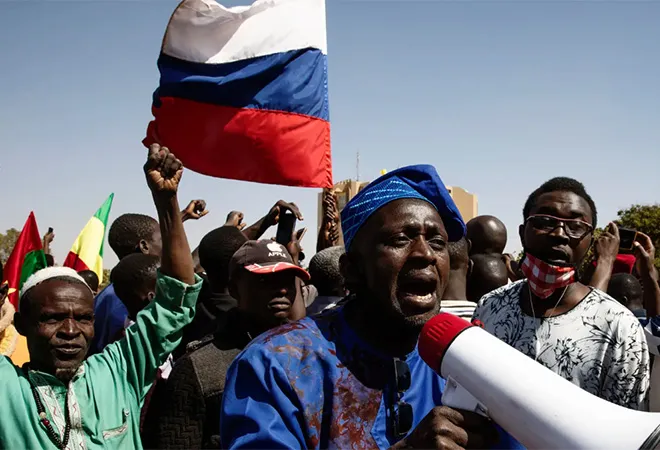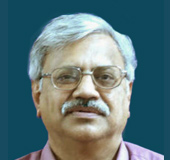
It is becoming increasingly clear that Russia is striving to re-establish its erstwhile pre-eminence in contemporary international relations by challenging the rules-based international liberal order and joining the centre stage of world politics that is currently dominated by the US and China. The post-Soviet Russia gradually began to reassert its power in world politics during the second decade of this century. Developments such as the Russian annexation of Crimea in 2014, Russian endeavours to re-establish regional hegemony in Eastern Europe to control developments in the Ukraine, and unambiguous Russian military support to sustain President Bashar al-Assad’s regime in the Syrian civil war offer abundant evidence of the growing reassertion of power by Russia. Moreover, Russia quite overtly tried to counter the US by building closer ties with Iran, America’s bête noire, and China, the principal rival of the US. Keeping its stakes in maintaining stability and peace in Central Asian states in sight, Russia prepared for the arrival of the Taliban in Kabul and has eventually contributed towards international legitimisation of the Taliban that captured power in Afghanistan on 15 August 2021. If Russia is visibly redefining its role in the politics of adjacent regions such as Eastern Europe, West Asia, Central Asia and South West Asia, its dynamic and ever-expanding role in the continent of Africa is also becoming conspicuous.
Russia in Africa
In fact, during President Vladimir Putin’s visit to South Africa and Morocco in 2006, Russia gave the commitment of investing US $1 billion in African countries, which set the pace for Russo-African ties. Before that, Russia had taken a generous step to write off the debt of African countries worth US $20 billion that was incurred by the latter countries from the former Soviet Union. Furthermore, as the then US President Obama imposed sanctions against the Russian occupation of Crimea in December 2014, Russia increasingly became apprehensive o pressures from the West on its foreign policy. In the process, Russia began to search for allies in Africa.
Developments such as the Russian annexation of Crimea in 2014, Russian endeavours to re-establish regional hegemony in Eastern Europe to control developments in the Ukraine, and unambiguous Russian military support to sustain President Bashar al-Assad’s regime in the Syrian civil war offer abundant evidence of the growing reassertion of power by Russia.
By October 2019, Russia was able to gather all the 54 African states, including 43 African heads of state at Sochi in the first ever Russo-African summit to promote bilateral and multilateral ties, in diverse spheres, with the African countries in a more systematic way. A combination of complex factors such as a quest to get access to deep water ports as well as international waterways involving choke points, to extract abundant mineral wealth, to meet growing demand of the energy sector, and to find markets for the sale of arms have been simultaneously at work while also shaping the Russian policy in Africa. Amongst the unique features of the Russian expansionism has been the fact that Russia’s state-owned companies as well as Private Military Companies (PMCs), especially Wagner, and the Russian presence on social media have been putting up concerted efforts to promote the Russian interests in Africa. Evidently, the Russian policy in Africa needs to be viewed and analysed in this overall context.
Russia’s quest to get access to the deep-water ports and gain from the oil revenues from eastern Libya led to its involvement in the Libyan civil war. Libya, a geo-strategically located oil and natural gas rich state on the Mediterranean coast, has been undergoing a protracted civil war since the fall of the Gaddafi regime in 2011. At this juncture, the United Nations (UN) backed Government of National Accord (GNA) based in Tripoli, previously led by Fayez al-Sirraj (2016-21) and currently led by Prime Minister Abdul Hamid Dbeibeh has a firm control over western Libya. As against the GNA regime, the Libyan National Army (LNA), based in Tobruk, led by General Khalifa Haftar has been operating from the east with support from Russia, Turkey, Saudi Arabia, and the United Arab Emirates (UAE). Russia provided Haftar with Mig-29 and Su 24 fighter jets as well as SA 22 surface to air missiles and anti-aircraft systems. Wagner also supported Haftar. Despite the hasty retreat of the LNA in mid 2020, Russia has continued with its presence in Libya with the aim of establishing itself as a powerbroker on the southern plank of the North Atlantic Treaty Organisation (NATO). Moreover, Egypt and Russia are supporting Haftar to contain Turkey in the Eastern Mediterranean. Russia’s industrial agreement with Egypt and its investments, including in the civilian nuclear realm, are near the Suez Canal in Egypt. Besides, it has exported arms worth US $4 billion to Egypt and concluded naval exercises with Egypt in June 2021. Apart from getting access to the Suez Canal via Egypt, Russia is active in countries around the Horn of Africa to gain access to the Red Sea.
A combination of complex factors such as a quest to get access to deep water ports as well as international waterways involving choke points, to extract abundant mineral wealth, to meet growing demand of the energy sector, and to find markets for the sale of arms have been simultaneously at work while also shaping the Russian policy in Africa.
For instance, in the Horn of Africa, Russia as well as Wagner had gone as far as to defend Omar-al-Bashir’s dictatorial regime in 2018–19 in the strategically located oil and gold rich state of Sudan. Although Russia has a naval agreement over the Port of Sudan, Sudan is reviewing it. However, in order to gain access to the Red Sea, Russia is also negotiating with states such as Eritrea to get access to the ports of Massawa and Assab and with Somaliland to get access to the port of Berbera. If the negotiations materialise, Russia will have access to Bab-el-Mandeb straits, Yemen, and Suez Canal while geographically it will be closer to Djibouti where China and the US have naval bases.
While pursuing its interest subtly, Russia also operates through Wagner, a company that enjoys ambiguous legal ties with the Russian state. Wagner has often tried to intervene in the domestic politics of states that are plagued with economic crises, poverty, internecine conflicts and political instability. Its support to President Faustin-Archange Touadéra of the Central African Republic (CAR), a resource rich state with uranium deposits, during the turbulent presidential and parliamentary elections with 400 troops, in December 2020, is a case in point. Beleaguered Touadéra also had a Russian advisor, Valery Zakharov. Charles-Armel Doubane, CAR’s Minister of Foreign Affairs, who objected to Zakharow’s role was sacked. Although Wagner repelled rebel offensives during the elections of the CAR, they reportedly were negotiating revenue sharing deal with the rebels to gain control over gold and diamond mines of the north.
Trade in Africa
Trade in arms is amongst the most significant drivers of Russian policy in Africa. Since 2014, a state-owned agency that exports military products and services called Rosoboronexport has signed multiple bilateral agreements with states such as Angola, Equatorial Guinea, Mali, Nigeria, and Sudan. These agreements include provisions for joint training of troops and countering terrorism. Russia has been playing a pivotal role in resource rich countries of the Sahel region such as Nigeria, Chad, Mali, and Burkina Faso in combatting terrorism. It is particularly active in Mali after the Malian coup in December 2020 since the senior officers from Mali had been trained in Russia. According to Stockholm International Peace Research Institute (SIPRI), Russia exported 18 percent of its arms to Africa between 2016–2020 with Algeria being the major recipient. From 2015-19, Russia accounted for 37.6 percent of the African arms market, which is above the US at 16 percent, France at 14 percent, and China at 9 percent, respectively.
Russia’s annual trade is roughly US $20 billion with Africa, which is only a tenth of China’s. However, Russia’s energy-related state-owned and private companies have started playing a major role in Africa. For instance, oil, gas, and nuclear energy-related companies such as Gazprom, Lukoil, Rostec, and Rosatom are active in Algeria, Angola, Uganda, and Egypt. Russia is also getting concessions to produce off-shore gas in Mozambique. As Russia’s minerals are difficult to extract, it is relying on Zimbabwe for the platinum group of metals, on Namibia for uranium, and Angola for diamonds. Russia’s largest aluminium producer Rusal has expansive bauxite mining interest in Guinea. This prompted Russia to interfere in the domestic affairs of Guinea and the then Russian envoy to Guinea, namely Alexander Bregadze, went as far to support President Alpha Condé for the third term in 2019 although it was unconstitutional. Eventually, Condé won the third term, in October 2020, amid violent protests.
According to Stockholm International Peace Research Institute (SIPRI), Russia exported 18 percent of its arms to Africa between 2016–2020 with Algeria being the major recipient.
Russia is conscious of Africa’s strength in the UN. Africa has three rotating permanent members in the UN Security Council (UNSC) and 54 member states in the UN General Assembly (UNGA). During the past few years, the three African permanent members of the UNSC— Côte D’Ivoire, Equatorial Guinea, and South Africa sided with Russia on important issues such as not allowing investigations on fraudulent elections in the Democratic Republic Congo (DRC), not condemning the military coup in Sudan by invoking principle of non-interference, and not condemning the actions of warlord Khalifa Haftar and, subsequently, by blocking the UK sponsored resolution on ceasefire in Libya.
Disinformation onslaught
Furthermore, Russia has earned notoriety for its action on social media due to its disinformation campaign. By and large, it indulges in spreading pro-Russian and anti-West messages by creating African hosts. In an attempt to franchise its model, the accounts of African hosts are linked to Yevgeny Prigozhin, a Russian oligarch with long standing ties with President Putin. He was indicted for interfering in the US elections and is also head of the Wagner group. Accounts linked to Yevgeny Prigozhin have been seen in countries such as Angola, the DRC, Guinea, Guinea-Bissau, Zimbabwe, Madagascar, and Mozambique. Identifying such accounts and removing them has been a work in progress. In October 2019, Facebook had removed dozens of accounts of authentic looking fake profiles which were working in a coordinated fashion to spread a disinformation campaign in African states. Such disinformation campaigns have been well documented in Libya since January 2019. The campaign has criticised the UN-backed government and highlighted the role of Russia as a stabilising influence in Libya. Similarly, after the coup in Mali in December 2020, thanks to the disinformation campaign, there were pro-Russian messages. In Ghana, a Russian sponsored troll factory was deployed to foment polarisation and in South Africa, Russia attempted to aggravate racial tensions through social media messaging.
Briefly, Russia has emerged as a force to be reckoned with in Africa. Ruthless pursuit of geopolitical, strategic, commercial, and economic interests has prompted Russia to support dictatorial regimes and woo fledgling but resource rich African states. In the process, it has interfered in domestic politics of such states by overlooking the considerations of human rights as well as democracy. Since Putin’s authoritarian regime is a harbinger of an alternative order, it neither cares for democracy nor a rule-based liberal international order.
The views expressed above belong to the author(s). ORF research and analyses now available on Telegram! Click here to access our curated content — blogs, longforms and interviews.




 PREV
PREV


